Apple's iPhone 4: Thoroughly Reviewed
by Brian Klug & Anand Lal Shimpi on June 30, 2010 4:06 AM EST- Posted in
- Smartphones
- Apple
- iPhone 4
- Gadgets
- Mobile
Performance
When the 4 was announced, my curiosity (and perhaps yours as well?) was about the flavor of Apple’s A4 SoC inside the phone. The rumor was that the A4 in the iPhone 4 had a full 512MB of memory, compared to 256MB in the iPad’s A4. iFixit took an iPhone 4 apart (with relative ease I might add) and confirmed the presence of 512MB. Look at the A4 in this picture, the Samsung part number on the right edge of the chip starts out K4X4G. The K4X denotes a Samsung mobile DRAM and the 4G refers to its density: 4Gbit or 512MB.
More memory should mean a smoother multitasking experience on the iPhone 4. Remember that iOS 4 keeps all fast task switching enabled apps resident in memory even after you’ve switched away from them. They are only kicked out of memory if you run low or if you force quit them. With more memory you should be able to keep more apps in memory without unwillingly forcing them out. The 512MB of RAM should also give the OS more breathing room in lighter multitasking scenarios, a problem many are already seeing on the iPhone 3GS running iOS 4. In practice the 4 is smoother when running iOS 4. There are still some hiccups but not as bad as on the 3GS, and definitely not as bad as on the 3G. The OS was clearly designed with the iPhone 4 as the performance target.
The big question that remains is what clock speed the iPhone 4’s A4 is running at. The assumption was 1GHz however Apple was very careful not to mention clock speed, unlike at the iPad launch. Saying nothing usually means there’s nothing good to say.
I ran a whole bunch of benchmarks on the iPhone 4 and the iPhone 3GS running iOS 4 to try and figure out what CPU speed we might be dealing with. The early reviews imply that the A4 in the iPhone 4 is running at a speed greater than the 3GS’s 600MHz, but slower than the iPad’s 1GHz. Let’s try and find out what it’s really running at.
We’ll start with the real world tests, first SunSpider. A javascript performance test this benchmark is completely network independent but it measures the performance of the browser as well as the underlying hardware. It is small enough to make memory size differences negligible so between the two iPhones we should be seeing a pure CPU comparison:
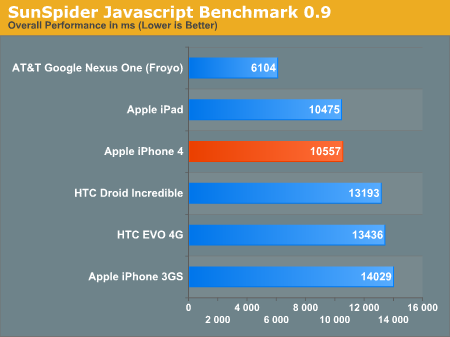
The iPhone 4 manages a time that’s 25% faster. Note that this test is just as much about the software stack as it is about CPU/platform performance. The Froyo update makes the Nexus One ridiculously fast in this benchmark. It just shows you how much room there is to improve performance on these Android handsets. The next leapfrog is going to be once the entire Android world moves to 2.2.
Next up is the Rightware BrowserMark. This test combines JavaScript and HTML rendering performance:
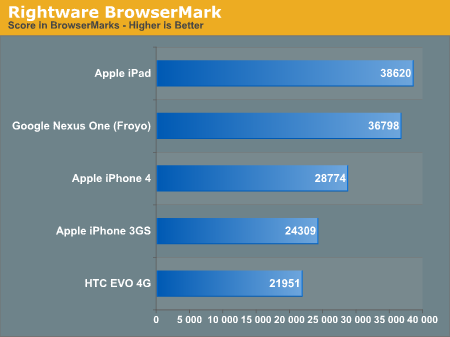
BrowserMark spits out an overall score but with no indication of what the score actually means. In this case we’re looking at 18.4% better performance than the iPhone 3GS. The iPad is 34% faster than the 4, which supports the theory of the A4 running at ~750MHz in the new iPhone.
There's also the possibility that the A4 CPU clock varies depending on load and other factors but the run to run consistency in all of our tests seems to indicate otherwise. We also can't ignore the fact that the iPad and iPhone now run vastly different OS revisions. In some cases iOS 4 actually takes a step back in performance compared to iOS 3.2. That undoubtedly makes the iPad vs. iPhone 4 comparison about much more than CPU performance.
Froyo's improved Javascript performance sends the Nexus One nearly to the top of the list here, only bested by the iPad. While Apple has definitely improved performance with the iPhone 4, it seems that it will only take a software update for Android phones to surpass it.
To measure web browsing performance I downloaded a bunch of different web pages and saved as much of them as possible locally on a server. I used WiFi on all of the devices to connect to my local server and timed average load time. I repeated the test at least 3 times and threw out any unusually high or low numbers. Performance was from a clean restart with no additional programs running in memory.
Note that these numbers aren't comparable to other reviews as we've updated software versions on two of the phones. The iPhone 3GS is now running iOS 4 which resulted in some numbers going up while others went down. And the Google Nexus One is running the officially released build of Android 2.2, codenamed Froyo.
What these tests should show is the overall performance of the platform when all network bottlenecks are removed. Obviously hiding in a tunnel under a lead umbrella will make any phone slow, but we’re looking at peak performance here.
The first test is the new AnandTech front page. Here we’ve got tons of images and HTML, meaning we’re stressing both bandwidth and code parsing speed.
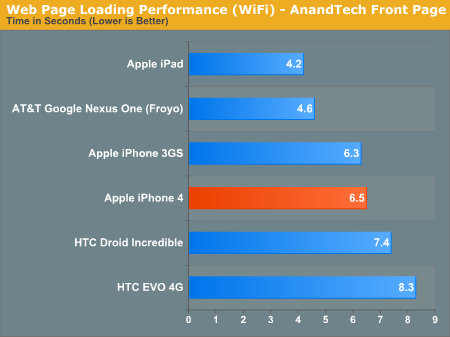
The iPhone 4 is no faster than the 3GS (actually slightly slower, but we'll chalk that up to timing variance) here. The Froyo update to the Nexus One makes it lightning quick, almost as fast as the iPad in our first test.
Next up we have the first page of our recent Zotac XBOX HD-ID11 review. The balance shifts from tons of images to more HTML processing:
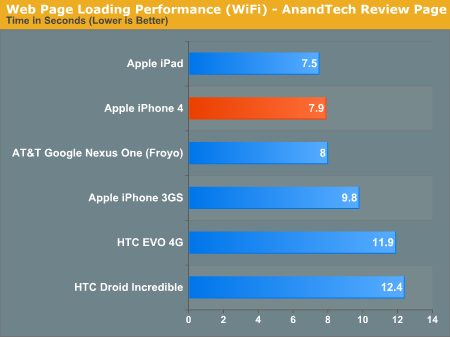
Here we see more of what I expected: the iPhone 4 is around 25% faster than the 3GS running iOS 4. Android 2.2 running on the Nexus One is basically as fast as the 4.
Using our Print this Review function, this next test loads our entire 2010 15-inch Macbook Pro review. While the other two tests had some flash ad content, this one is completely devoid of it so the HTC phones shouldn’t be penalized:
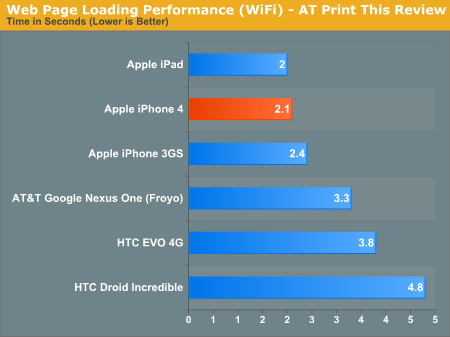
Here the iPhone 4 is 11% faster than the 3GS and about the speed of the iPad. There are other bottlenecks at play here so we don't get further performance scaling. The Froyo update helps the Nexus One a bit but the iOS devices are still quicker.
Our most intensive test is up next with a load of the Engadget front page:
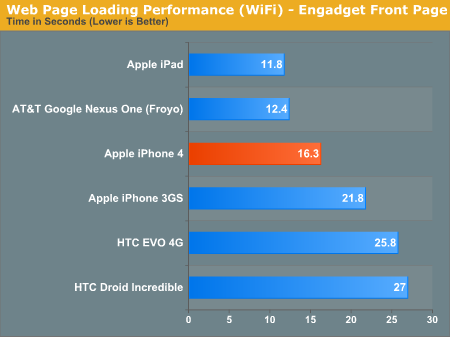
The Nexus One is ahead of the 4 once more with its Froyo update. And the iPhone 4 is 34% faster than the 3GS.
Our most CPU bound test is up next. I put together a custom page with a ton of tabular content and a single page copy of our 15-inch MBP review to make the load take some time at least.
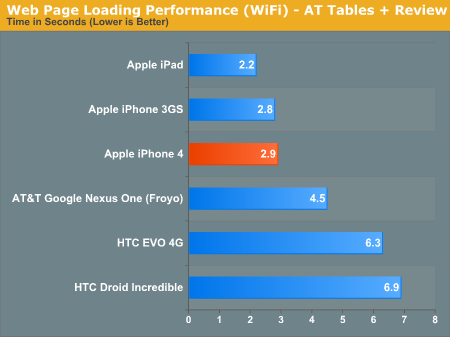
Surprisingly enough there's no difference between the 3GS and the 4 here, perhaps my test is less CPU bound than I thought. Froyo improves the Nexus One's performance a little bit.
Low Level Synthetic Tests
If we assume that we’re mostly CPU bound in all of these cases (a fair assumption given how fast Atom can run through all of these tests), then we’d be looking at a ~750MHz clock speed for the iPhone 4’s A4 assuming no other architectural changes. That’s actually a pretty big assumption. The A4 is widely believed to be a 45nm SoC using an ARM Cortex A8. At 45nm there should be room for a larger L2 cache than what was used in the iPhone 3GS’s SoC.
Perhaps some more synthetic tests will help us figure out what’s going on. I turned to Geekbench, now available in an iOS version.
Geekbench spit out a number of overall results that gave me a good enough summary of what’s going on to make an educated guess:
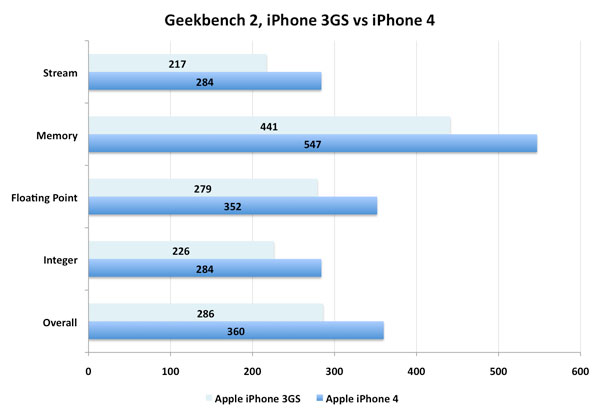
The CPU specific tests all indicate the iPhone 4 is around 25% faster than the iPhone 3GS. That would imply at least a 750MHz clock speed if all else is the same. Assuming we don’t get perfect CPU scaling with all of these tests, I’d venture a guess that 800MHz is more accurate. If the A4 does indeed have larger caches however, Apple could get away with a lower clock speed.
The memory results are particularly telling as they all scale very well going to the iPhone 4, better than the CPU results in fact. This could lend credibility to the theory of larger internal caches or perhaps to an improved (faster) memory subsystem.
Unfortunately until we get the iPad on iOS 4 we can't get a better idea of CPU scaling. I'm not even sure how reliable that will be at this point. If Apple was willing to change the amount of memory the A4 package housed between the iPad and iPhone 4, who is to say that it wouldn't have a slightly different design for the iPhone 4 (e.g. larger caches). The designs may not be physically different but we may instead be looking at binning. Given Apple's unwillingness to talk about the architecture here I think the safest bet is that we're looking at an 800MHz ARM Cortex A8 core in the iPhone 4 and a 1GHz core in the iPad.
Why the lower clock? It's all about battery life.










270 Comments
View All Comments
Anand Lal Shimpi - Wednesday, June 30, 2010 - link
It honestly is basic differences in UI design. Unified settings panels (iOS) vs. per-app options and global settings (Android), much more freedom to configure how you want things displayed/presented, extending all the way down to the keyboard (Android) vs. a single Apple dictated way. These are the types of things that make the iPhone more of an appliance, basically if you like Apple's approach then there's no better device for you. A *lot* of users don't, and that's where Android comes in to play. I don't believe the power and flexibility of a PC-like device is a bad thing, but not everyone feels the same way. Take a die hard iPhone user and give them your Droid, you'll probably get the same response I did when I let some of those folks use the Nexus One or EVO 4G. It's really a preference thing, it reminds me a lot of the Mac vs. PC debates.And while i haven't played with the Droid, the scrolling issue is present on the Nexus One with live wallpapers disabled as well as enabled. Although enabling them makes it worse. The HTC Incredible is the first Android phone I've used that actually improved it, although didn't solve it completely.
I expect that in the next major Android update Google will fix it once and for all. I hope.
Take care,
Anand
JAS - Wednesday, June 30, 2010 - link
Yes, "more open, more configurable" is a double-edged sword. A comparison of Microsoft Windows and Macintosh OS X is apt in this regard.P.S. -- Can we advance beyond the juvenile label of "fanboy" when criticizing a person's like for a product?
bplewis24 - Wednesday, June 30, 2010 - link
Juvenile comes with the intent. I have the utmost respect for Anand and his opinion/reviews. If you take "fanboy" as a disparaging remark, fine, but it essentially means you have a bias or preference that obscures some of your objectivity.Brandon
The0ne - Wednesday, June 30, 2010 - link
As I've often expressed here, I like the reviews to not have any 1st person views. I don't care if one waited for 6hours for a phone. I don't want to hear any "this phone is the all to be". I just want a detail review of the phone and it's features. If one can qualify and/or quantify the differences with other products great. If you can't then don't, rather then having the innate urge to add your own opinions.Yes, the apple UI is more smooth, the experience is more enjoyable. The druid UI is a tad slower but by no means going to destroy or ruin anyone's experience. If you can't justify it, don't!
Lastly, the problem with 1st person perspectives being included in reviews and especially technical reports is that the reader will see it as favoritism. This is why absolutely NO credible technical and scientific review/report is written this way. I don't write my engineering tests and reports in 1st person. Just stick to the material and leave opinions out of it. This type of review ONLY happens online and sadly it's affecting technical and scientific materials as well.
Do the job, state the facts and tests and let the reader decide how to deal with it. Don't offer the reader any types of suggestion or persuasive comments. If you do include it, like other websites, in the editorial section or something similar.
kmmatney - Wednesday, June 30, 2010 - link
I wouldn't want to read reviews that just state facts. I'm an engineer/scientist and have written many peer-reviewed scientific papers. For tech reviews, though, I really appreciate user experience. There are just too many intangibles that can't be expressed by facts and tests. That's why I have been reading Anadtech for over 11 years - I appreciate the blend of techiness and user experience.totenkopf - Wednesday, June 30, 2010 - link
I have to agree with TheOne on this. Also, you can express "intangibles" without using the first person... If the iPhone's UI feels smoother than another phone then just say that and leave off the "I feel" bit.Remember that any statement comparing the iPhone to "Android" will have its flaws. You can only compare the iPhone 4 to other phones, not android. Any such statement will inherently be some form of generalization. Besides, Comparisons made with particular Android phones will be far more helpful as many android phones offer an experience distinct form any other Android phone.
It's really not that uncommon for iPhone users to play with an Android phone and really like it. Many of them actually seem quite surprised that they actually like it; some merely think that iOS is the only show in town as it has been the best for a long time. Widgets, in particular, offer a lot of customization and, perhaps just as importantly, personalization, that many iPhone users seem to appreciate. If used correctly, widgets can multiply the functionality of your phone many times over, and in some cases preclude running many apps at all. That said, setting up an android with just the way you like it and hunting down the newest and best apps and widgets can be an ongoing struggle. However, many people will enjoy it immensely if for no other reason than to make their phone that much better in their own eyes.
There! My experience with android without sounding too biased... I think ;) It certainly sounds better than "Android rulz 'cus widgets are soo good and apple doesn't even have them because apple is fail!"
John Sawyer - Thursday, July 1, 2010 - link
As an iPhone user for the past year, I can concur with your observation that many iPhone users would be impressed with the latest Android phones. I've tried the Evo for about ten minutes, and during that time, I did some web browsing, ran some apps, etc., and it was fast (even with a 3G connection), seemed polished, and I wouldn't complain too much if it was the only phone I had to use. If I had the chance to use it longer, I might start seeing its deficiencies, but a quick look, looked good.Though a week later, the iPhone 4 was released, and I was blown away by its display, which no other phone matches yet, though I'm somewhat biased about that since I like to be able to read tiny text.
The0ne - Thursday, July 1, 2010 - link
The problem with user experience is that it's just that and it affects how readers perceive the product. I don't mind really that reviews are done this way, but many are done extremely bad. Here are a few examples of comments people include in their reviews..."I let me wife play with it for a day or so and she loves it!" This is quite common for PMP player reviews.
"This is the best thing ever to come out on a phone..." Best thing is more or less an exaggeration. Way too many improper adjectives are used in reviews. Anandtech is no exception to this.
"I like it..." Okay, that means what, I should too?
strikeback03 - Thursday, July 1, 2010 - link
I disagree, in that I think the subjective "feel" of one phone (and OS) relative to another is largely subjective and can't be quantified in just plain numbers. Would you really feel better if he stated that "after observation with a high speed camera phone X illustrates a scroll with 5 frames and phone Y does so with 20" as opposed to "phone X is noticeably choppier"? Or say for example Sprint shipped a special edition EVO with 768MB RAM, we know that is 50% more, but would it actually make a difference in your interaction with the phone if you had less than 20 apps open?I have an HTC Touch Diamond, a WM 6.1 phone with TouchFlo 3d. None of the reviews I read before purchase adequately described how clunky the interaction between the TouchFlo plugin and the background OS is, or how poorly optimized WM6.1 is for a touchscreen, and certainly not how the speed of the device goes from marginal when new to completely unacceptable after a few months and requires a hard reset to restore.
ipredroid - Saturday, July 3, 2010 - link
What many fail to realize is with out opinion there would only be numbers and no reason to have site with user friendly technical data (a site like this). Everyone's opinion is biased or influenced by something, simply sticky by facts and zero emotion devoted towards every product is impossible. Many opinions itself is laced in bias preference for facts.I for one want as much information as possible not half the information.
Facts and opinions have and always will be better than just one of them. Would you rather have technical data about someones trip to Mt. Everest or an opinion. I would want both, so would everyone else or else you are missing facts.
Science and opinion go hand in hand. Cause and effect.